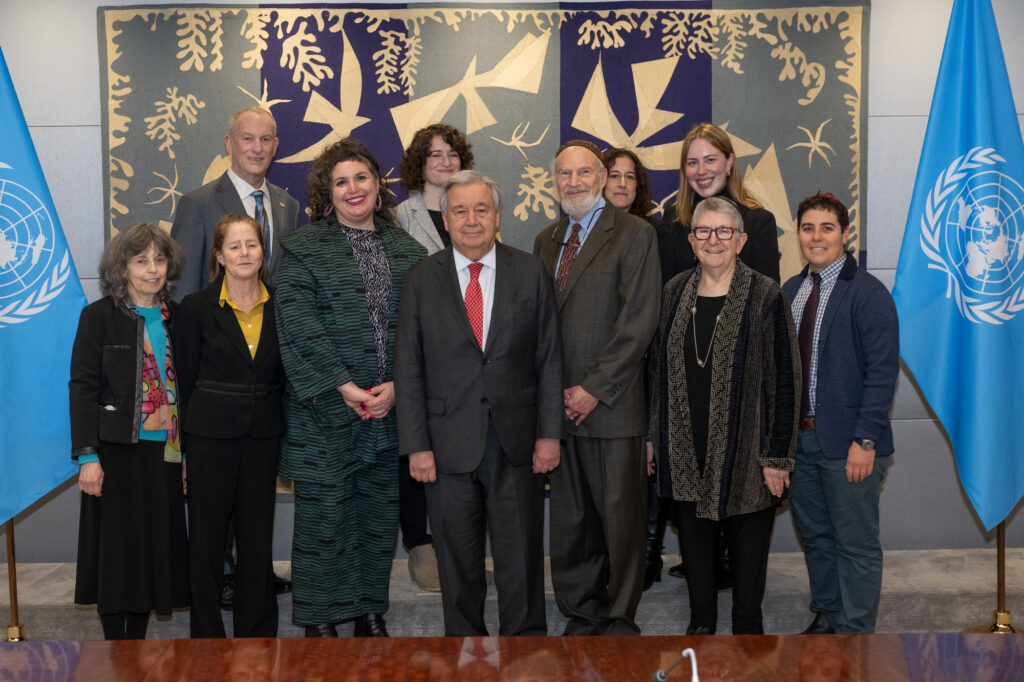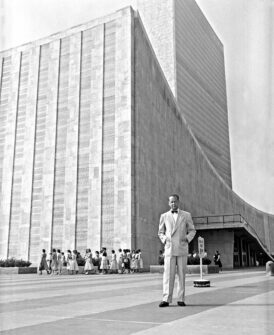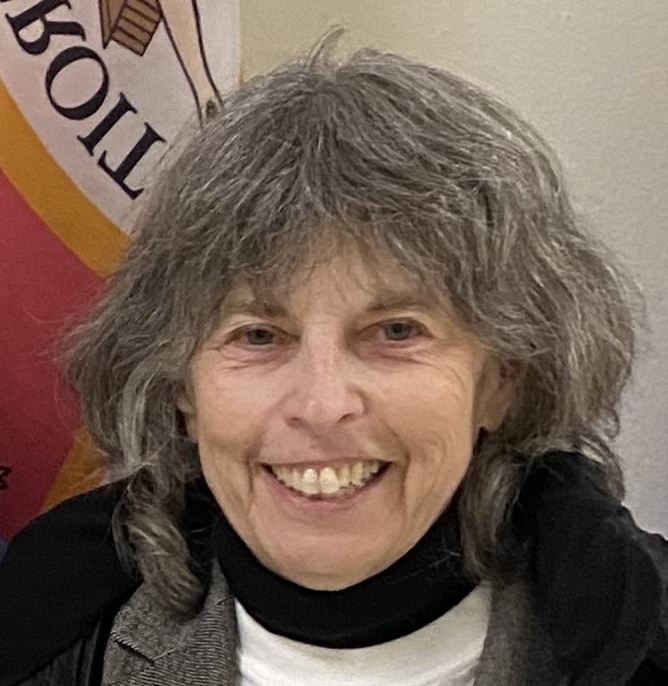
On January 25, 2023, I, along with 9 other rabbis, representing another 265 rabbis from around the globe and every imaginable denomination, met with Secretary General António Guterres at the United Nations headquarters. You might think that we went to tell him what most Jews are presumed to believe, namely that the UN has it out for Israel and always treats the Jewish state unfairly. Nothing could have been farther from our minds. Rather, we went to thank him and the UN’s agencies for courageously calling out Israel for the humanitarian crimes they are committing in Gaza and to promote our cause: Ceasefire Now!
For me it was a powerful moment on a long journey. When I was a fourth grader in Brooklyn in the 1950s, my beloved teacher, Evelyn Farrar, taught us about the United Nations. We memorized the lyrics to “United Nations on the March,” because the idea of “a hymn to a new world at birth,” a “free new world” achieved by diplomacy, encapsulated her hopes and dreams for what the United Nations could be. We visited the sacred site of the UN Headquarters itself and learned about the peacemaking accomplished by the Secretary General, Dag Hammarskjöld. Her lessons worked: as a child I fervently believed that the UN could bring about a world without war.
When I was in high school, I returned to the UN. On June 5, 1967, I joined other young Jews in a rally to encourage the US to help Israel just as the ’67 war between Israel and the neighboring Arab nations of Egypt, Syria, and Jordan was beginning. The new Secretary General, U Thant, had just withdrawn UN peacekeeping forces from Gaza and the Sinai at Egypt’s demand, and American Jews were worried about Israel’s safety. Attending that rally led me to spend time in Israel two years later and soon thereafter to become one of the first women ordained as a rabbi.

In the fifty-seven years since my last trip to the UN, I have struggled to come to terms with the results of the ’67 war. In spite of what I believed in my youth, I see now that it led to Israel’s continuous occupation of Palestinian lands and unwillingness to grant Palestinians freedom in the land they share. But I never imagined that the current crisis would lead me back to the United Nations, hoping, once again, that they could help bring about an end to war.
As an active member of Rabbis for Ceasefire, I am honored to have been part of the delegation that met with the current Secretary General, António Guterres to discuss the terrible destruction Hamas wrought on October 7, 2023 as well as the unfathomably disproportionate destruction that Israel has committed in response.
Our meeting took place a few days after the Secretary General’s bold speech at the opening of a summit of the G77+China that met in Uganda. In that speech, he condemned Israel’s “unprecedented” and “wholesale” destruction of Gaza that has claimed the lives of 152 UN staff members among the 27,000 dead. The Secretary General pointed to the daily dangers survivors endure, not only bombs and bullets but damaged roads, communication blackouts, disease, and famine. He called the conflict “a threat to global peace and security” that must come to an end. That speech was a resounding echo of what the 275 Rabbis for Ceasefire are demanding: Ceasefire Now.
We met with him both to thank him for his courageous words and to find out how we could help add a Jewish moral voice to the UN’s efforts: to stop the threat to global peace and security, end the current attacks that are destroying Gaza and its inhabitants, and hold Israel accountable.
His answer was clear: continue to work for a reconciliation between the Israeli and Palestinian peoples. Help them understand that for the security of all they must learn to live together in peace. Keep up your efforts, he recommended. Likewise, he promised us that he would work toward a ceasefire and, to the best of his ability, carry out the provisional judgments of the International Court of Justice that, although they fell short of demanding an end to hostilities, recognized the critical need to end Israel’s assault on Gaza’s civilian population, cultural institutions, and infrastructure and allow humanitarian aid to enter unimpeded.
Our conversation moved us beyond words, for this Secretary General follows in the path set by Hammarskjöld and the other men who preceded him as rodfei shalom, seekers of peace. A deeply faithful Catholic himself, he clearly understood the importance of the religious faith that brought us to work for justice in Israel/Palestine. We left feeling seen and heard by him; believing that he would, with grace and humility, continue to work toward our common goal of a lasting peace.
His answer was clear: continue to work for a reconciliation between the Israeli and Palestinian peoples. Help them understand that for the security of all they must learn to live together in peace.
We closed by offering him the ancient priestly blessing in the book of Numbers: “May the Holy One bless and protect you. May the Holy One shine upon you and be gracious to you. May you feel empowered to work for peace, shalom.” A hush fell over the room, and some of us found ourselves close to tears. The Secretary General told us that he’d sleep better having met us today. And we knew we would as well.
Little did we know that the day following the ICJ ruling, which will result in a long investigation of South Africa’s charges of genocide against Israel, Israel would react by claiming that 12 of the 13,000 UN workers for the United Nations Relief and Works Agency for Palestine Refugees in the Near East (UNRWA) took part in the October 7, 2023 massacre. The UNRWA leadership responded swiftly and decisively, condemning the acts, firing nine of the workers (two are dead and one yet to be identified), and beginning an investigation into the claims. Despite this resolution and with no regard for the impassioned plea of the Secretary General, the US and many of its allies have temporarily suspended funding UNRWA. When funds run out at the end of February, the humanitarian crisis that exists in Gaza that was the focus of the Court’s mandate will become even more devastating. UNRWA is the only agency that makes medicine, food, and shelter available to the 1.5 million displaced residents of Gaza. The tragedy worsens and worsens.
We left the meeting with new hopes and now new fears, so we continue to pray: that the leaders of our country understand the gift that is the United Nations and its Secretary General. That they and their allies restore the funding to UNRWA and not become responsible for more death. That they heed the words of all of us who demand a permanent ceasefire now. That they stop using their veto to keep the UN Security Council from doing what it was created to do, as I learned in that song so many years ago, to bring into being “a new world at birth.” A world, as the song also says, “where our children (and all children) shall live proud and free.” And may it be so.


Thank you dear Temple University colleague, Rabbi Rebecca, for all that you do.
Thank you Notre Dame (where I served as a professor of history for 23 years) for Contending Modernities.
Thank you Professor Atalia Omer for your amazing Shofar 41.2 essay
May we all be rodfei shalom, Kathleen Biddick, Professor Emerita, Temple University
Thank you Rabbi Rebecca for this inspiring and timely essay. May we all work for peace in every avenue available to us. As a pediatrician and medical humanitarian, I am crushed by the devastation of lives, livelihoods, and medical infrastructure in Gaza. If everyone would cry out for peace–what would that look like?